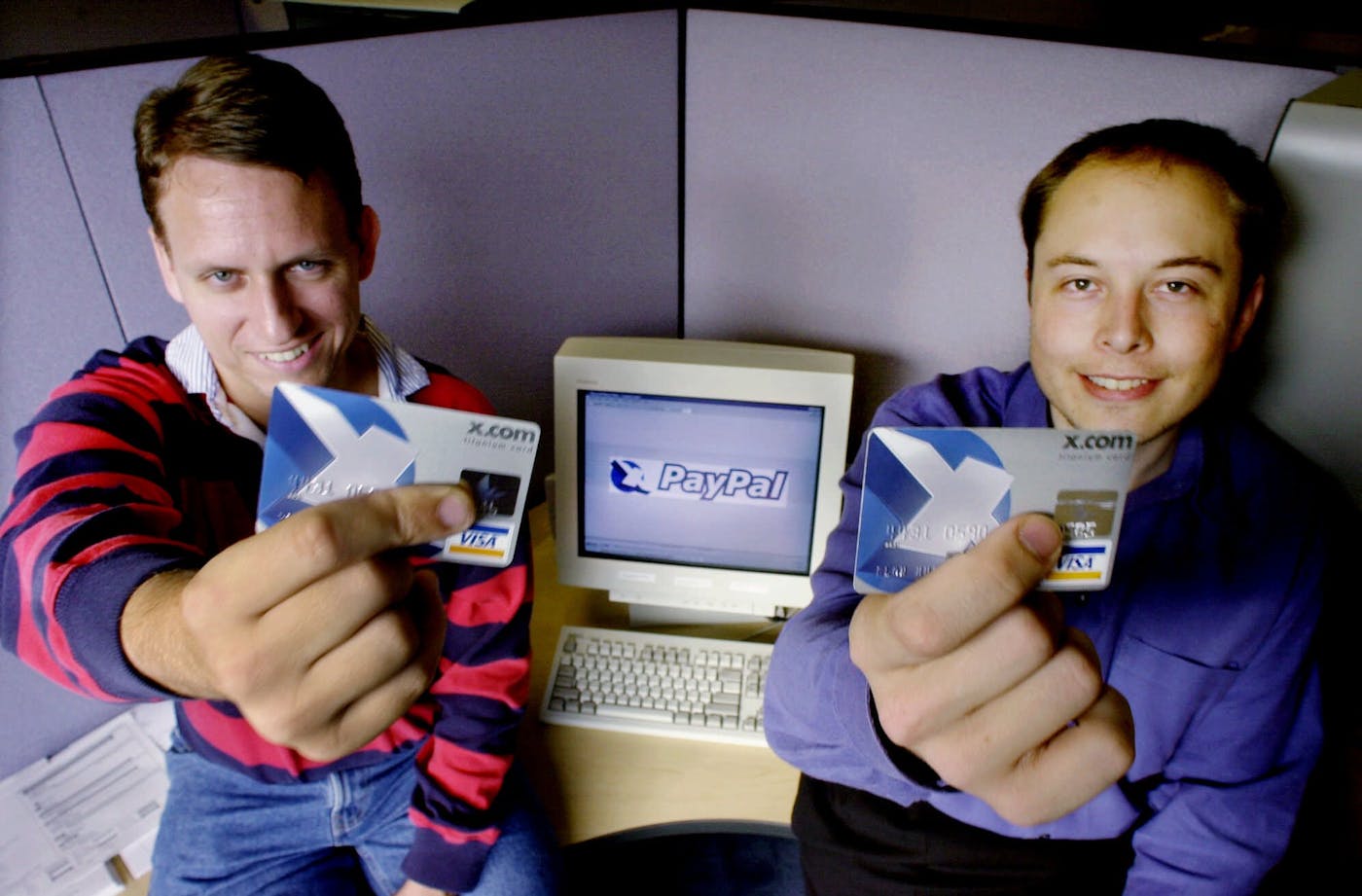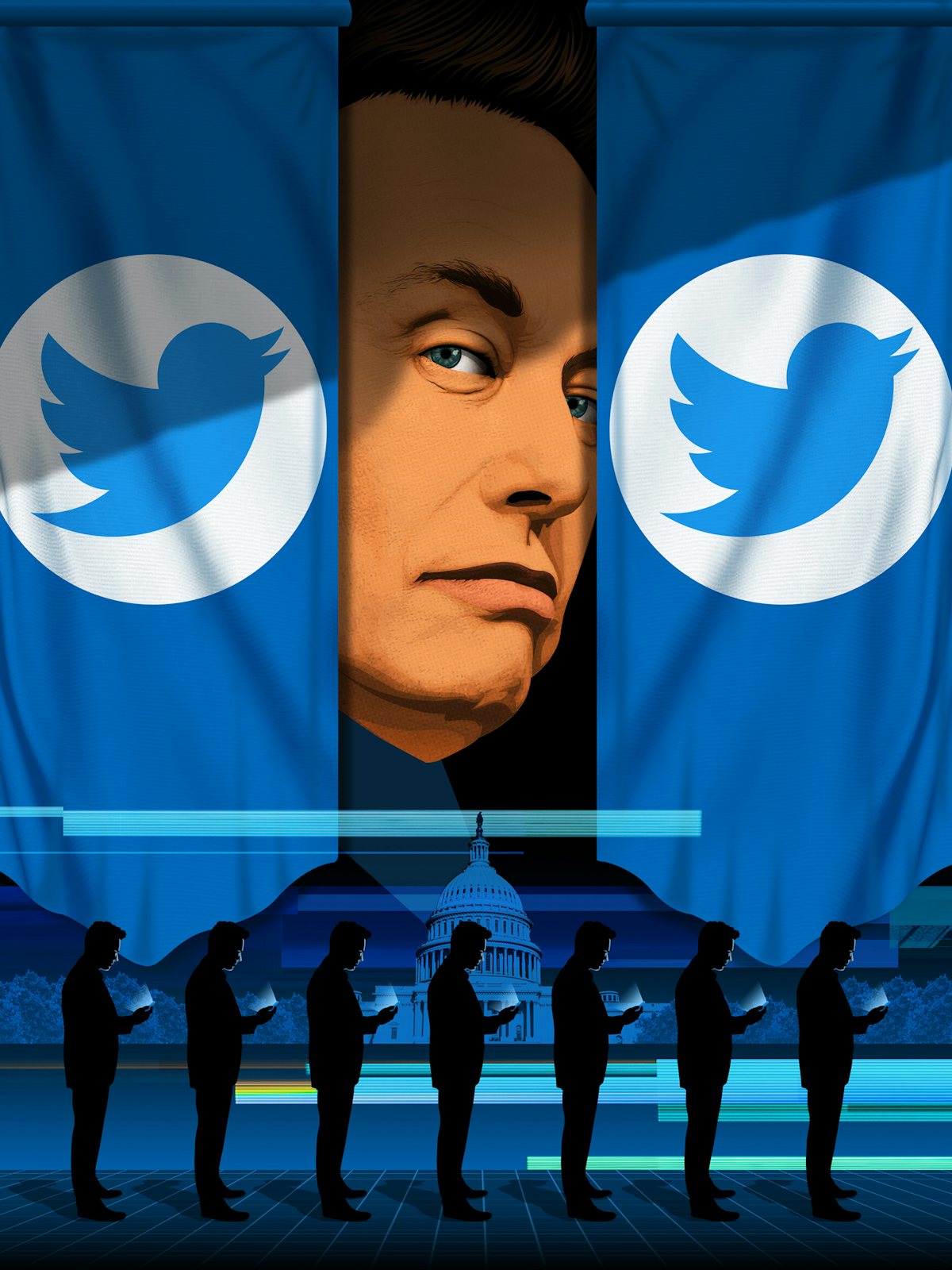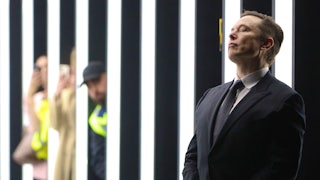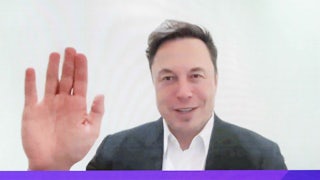In early January, Elon Musk took to Twitter, the unprofitable social network that he had sunk $44 billion into purchasing two months earlier, to brag. Or maybe to whine. Maybe Musk himself didn’t know, and he was just doing what he does best: getting people to pay attention to Elon Musk.
“12 months ago,” Musk tweeted, “I was Person of the Year.”
It was, whatever Musk’s intention, a pathetic moment, even by his standards. Volodymyr Zelenskiy, the Ukrainian president who had spent much of the last year facing down a brutal Russian invasion, had just been announced as Time magazine’s latest luminary. Musk, meanwhile, had spent much of the year trying to buy Twitter, then trying to back out of buying Twitter, then being forced to buy Twitter, then chaotically managing Twitter. Now he had logged on to try to steal the spotlight back from Zelenskiy, a fitting act for someone who had spent much of the previous year behaving like a toddler.
It was also a fitting moment to reflect on just how much Musk’s reputation had changed over the preceding year. Yes, Musk had received ample and deserved criticism before he purchased Twitter. He was at best a wild overpromiser, at worst Silicon Valley’s Harold Hill. His rockets sometimes blew up. His electric cars sometimes caught fire. He was a union-buster and maniacal boss. He was a Covid skeptic who hated taxes and had been sued by the Securities and Exchange Commission for tweeting (of course) that he would be taking Tesla private at $420 a share. On that note, he was also immature, impulsive, and painfully unfunny—often on Twitter.
And yet, in late 2021, Musk was in many ways the last American tech CEO who could be feted in lavish terms. Time lauded him as “clown, genius, edgelord, visionary, industrialist, showman” in a cover story that celebrated his efforts to save humanity from existential doom. Musk was, wrote not one but three Time journalists, “our avatar of infinite possibility, our usher to the remade world, where shopworn practices are cast aside and the unprecedented becomes logical, where Earth and humanity can still be saved.” He was, moreover, someone to believe in: “The man from the future where technology makes all things possible is a throwback to our glorious industrial past, before America stagnated and stopped producing anything but rules, restrictions, limits, obstacles and Facebook,” the authors wrote.
The inclusion of Facebook was telling. America had soured on tech. Once touted as a boy genius, Facebook founder Mark Zuckerberg was now seen by many as a supervillain. He and leaders from Twitter, Apple, and Google had been hauled before Congress to discuss, among other things, election interference, censorship, and market power. The social networks and tech companies that had been touted for years as hubs of not just innovation but connection—and sometimes democratization and liberation—were now seen as engines of inequality, disinformation, and division.
Musk had, despite his best efforts to the contrary, largely avoided being caught up in the techlash. Facebook, Apple, Twitter, and Google found themselves trapped in a pincer movement between both political parties: Democrats were increasingly wary of their monopolistic practices; Republicans were railing on cable news about the (largely unproven) left-wing bias of these California-based companies. There was talk of nationalizing Twitter, of breaking up Facebook, Apple, and Google—and of, at the very least, submitting all of them to more regulatory oversight. Musk may have been fabulously wealthy, but his main companies, the electric car producer Tesla and the space transportation and exploration firm SpaceX, received little such attention from politicians or regulators. Indeed, Musk has, until quite recently, maintained cozy relationships with politicians from both parties: Democrats liked his commitment to green energy; Republicans liked his libertarian, anti-tax bent.
Zuckerberg could no longer credibly claim, as he had in 2012, that his company “was built to accomplish a social mission—to make the world more open and connected.” But Musk could still talk in grandiloquent terms about delivering humanity from certain doom—and then tweet a picture of a unicorn farting. He was Big Tech’s last remaining golden boy. He was the world’s richest man.
And then he bought Twitter.
Musk framed his takeover in typically messianic terms. “Twitter aspires to be the most respected advertising platform in the world,” he wrote in a message to advertisers on October 27, on the morning his purchase was finalized. He acquired the social network, he said, to ensure that Twitter was “a common digital town square, where a wide range of beliefs can be debated in a healthy manner.”
He continued: “There is currently great danger that social media will splinter into far right wing and far left wing echo chambers that generate more hate and divide our society.” Twitter, in his conception, would be a true marketplace of ideas, a place where the wisdom of crowds would push the cream to the top. In the abstract, it’s an appealing, if quixotic goal: turning a social network that had, in recent years, been a haven for extremists and bigots and a tool for election interference and a coup attempt into a digital School of Athens.
In practice, however, Musk meant something much different. His comments were an implicit rebuke of the company’s previous overlords who, in his opinion, had caved to the woke mob and Democratic elites. They were also a form of media criticism. Musk, like many of his fellow titans of industry, had grown skeptical of the press, which was fawning in Silicon Valley’s early days but had grown increasingly skeptical and combative. They now saw the press as “biased against the industry, and so they began to develop a grudge that was analogous to the one that had given birth to Fox News” in the mid-1990s, press critic Jay Rosen told The New Republic. In his first five months in charge, Musk has sought to make Twitter “fair and balanced” in exactly the same way: by aggressively catering to a group of right-wingers and reactionaries who are intent on pushing their ideas into the mainstream. Now, Musk is reimagining Twitter’s public square in his own image.
Most Chaotic CEO Ever
George R.R. Martin’s aphorism about novelists also applies to CEOs: There are architects, who plan everything methodically, and gardeners, who plant seeds and see what happens. Musk, famous for winging it throughout his career, is, like Martin, a gardener—if the gardener also periodically doused his plants with gasoline and lit a match. (He’s also like Martin in that he’s great at starting ambitious projects but not completing them—but enough about The Winds of Winter.)
Chaos follows him wherever he goes. A whirlwind of frenetic activity, Musk has spent much of his career dashing from one business to another, making monumental, often unrealistic demands of his employees, whom he works to the bone in service of his totemic ambition. Already rich from the sale of an earlier company, the South African–born Musk made his fortune when PayPal—the payment platform he co-founded before being ousted in a coup—was sold to eBay in 2002 and immediately sunk it into not one, but three new ventures: Tesla, SpaceX, and Solarcity (a green energy company that merged with Tesla in 2016).
For some, it’s been awe-inspiring to watch. “He’s less a CEO chasing riches than a general marshaling troops to secure victory,” writes Ashlee Vance in his 2015 biography, Elon Musk: Tesla, SpaceX, and the Quest for a Fantastic Future. “Where Mark Zuckerberg wants to help you share baby photos, Musk wants to ... well ... save the human race from self-imposed or accidental annihilation.”
Musk is certainly as demanding as a general—he expects his employees to be more or less constantly on the job—but he’s hardly as organized. His companies are conceptualized as products serving big ideas—usually one big idea: the salvation of mankind—but are often seemingly governed by his shifting whims. Tesla and SpaceX both have huge valuations, but it’s still not clear whether they deserve them or if they will ever come close to fulfilling their founders’ sky-high ambitions for them. SpaceX has had a string of successful rocket launches; its revenue isn’t publicly disclosed but is speculated to be in the low billions. Tesla has been dogged by technical problems, some of which have been linked to serious accidents and deaths; has struggled to ramp up its manufacturing capacity; and is currently seeing demand decline. In February, more than 350,000 of its cars were recalled over concerns about its self-driving assistance software. (Musk, to be fair, had long insisted that Tesla stock was overvalued: In 2022, it dropped from nearly $400 a share to a low of less than $110.) More than anything, Musk casts himself as a new kind of visionary. He “willingly embodies the modern-day tycoon in a way that other tech executives couldn’t—or don’t want to,” said Kate Losse, an early Facebook employee who served as Mark Zuckerberg’s speechwriter.
The chaos surrounding Musk often makes it difficult to tell a coherent story about him. (In this sense, he is similar to the man who preceded him as Twitter’s perennial main character: Donald Trump.) His companies often seem simultaneously successful and unsuccessful, thrilling ventures that have never come close to living up to the hype. This is one reason why writers are so fond of describing him as a twisted mass of contradictions: He is at once a clown and a prophet, Willy Wonka and Henry Ford. Musk may act like an immature child, but surely—surely!—it’s all in service of a larger vision. The chaos emanating from Musk is proof of his genius; it exists in service of the greater good.
With Twitter, alas, the chaos is just chaos. Musk may have walked into the company’s San Francisco headquarters with a bathroom sink (this was what passes as a joke for him: “Entering Twitter HQ—let that sink in!” he tweeted) and a lot of big talk about town squares and free speech, but he has shown no indication that he knows how to make it profitable. This is bad news for Musk, since profits are a necessity: Servicing the interest on the debt he took on to acquire the company will require nearly a billion dollars a year, a daunting challenge for a company that has only posted positive net income twice, in 2018 and 2019.
This has, in turn, necessitated widespread job cuts—more than 50 percent of its workforce has been let go since Musk acquired Twitter—leaving the impression that the site is being held together by wire and string: Layoffs in November decimated its trust and safety and communication teams; even engineering positions have been cut significantly, leading to widespread concerns that the site could simply stop functioning at any moment.
Musk needs Twitter to make a lot of money fast. But pressed for details, he has produced the business plan equivalent of a cocktail napkin with an arrow pointing skyward hastily drawn on it. One of his first moves was to sell the company’s blue verification badge for $8 per month; a New York Times report found that almost 140,000 people signed up over six days in early November, and recent reports suggest that there are currently around 340,000 subscribers. But if one million were to sign up, the program would still net less than $100 million a year—one-tenth of what he needs to service the debt, let alone make a profit. Unsurprisingly, given his history with PayPal, Musk hopes to dramatically increase Twitter’s ability to process payments; unfortunately, regulatory demands mean this likely won’t be implemented for at least a year. Aside from that, Musk’s other big revenue idea is for Twitter to grow—like, a lot. Twitter currently has just over 350 million users; Musk’s goal has been to almost triple that figure by 2028. Terraforming Mars over the same period may be more likely.
How Is Twitter Changing?
Musk may need Twitter to make a lot of money fast, but, observing his first five months in charge, you get the sense that, while profitability may be an existential concern, it’s hardly a first-order one. Casting himself as an edgelord CEO, Musk has, over the past year, done his best to occupy the role that Donald Trump did before he was suspended from the platform after using it to foment an attack on the United States Capitol: He is Twitter’s perennial main character, whose antics set the day’s agenda. Like Trump, he is a divisive presence—his army of slavishly devoted fanboys duke it out with haters in his mentions—and also an inescapable one. (Unlike Trump, his presence is manifestly inorganic, the apparent product of market research and Zoom meetings about how best to connect with teenage boys who love Rick and Morty.) Still, Musk’s desperate, inexhaustible need for attention is one explanation for his decision to make such a reckless purchase.
It’s whom Musk craves attention from that is particularly revealing, however. Musk needs Twitter to grow more or less exponentially; his stated goal is to make it a neutral marketplace of ideas, favoring neither left nor right, where people have civil discussions about the day’s most important issues. If one sets aside the main flaw with the digital town square premise—what do you do when one group of debaters starts from the premise that the other is a deviant mass of blood-drinking pedophiles?—these goals are complementary. Musk needs Twitter to grow; making it a safe space for Democrats and Republicans alike is sensible from a business perspective and, given the larger regulatory climate, a political one.
Musk has not run Twitter this way. His Twitter is not a digital town square, nor is it a company that has made any effort to provide balance or neutrality. It is, instead, abundantly clear that he is running a company that favors right-wing users and their attendant grievances. “It’s not an evolution—it’s more of an unbuilding of Twitter and a takeover by the online right,” Jay Rosen told me. “Maybe not a completed takeover, but it’s a very bold and obvious campaign to, as the right wing sees it, address an ‘imbalance’ that they think is there. Though that’s what they think about the entire media world. It’s not that different, except the owner—and head un-builder or, perhaps, destroyer—of Twitter is both a captive and a captain of this discourse.”
Musk has, during his brief stewardship of Twitter, happily acted as a customer service representative for a host of repellent, minor figures on the right, like Ian Miles Cheong, who has advocated for, among other things, mandatory execution for shoplifters, and a comrade of his, a conspiracy theorist who goes by the handle @catturd2. When Cheong and @catturd2 sensed their engagement drying up, they turned to Musk, who had someone look into it immediately—presumably by ordering employees to find out why the tweets from a guy who didn’t even have the foresight or wherewithal to register the handle @catturd, or, for that matter, @catturd1, were receiving fewer likes than usual.
He has, similarly, reinstated a host of banned right-wing accounts: most famously that of former President Donald Trump (who hilariously can’t tweet due to an exclusive agreement with his own moribund social network, Truth Social), but also those of white nationalist Nick Fuentes (whose account was suspended less than 24 hours after it was restored), election denier Michael Flynn, and a raft of other kooks, nutcases, and hate-mongers. Twitter has, over the same period, suspended several accounts belonging to journalists and left-wingers, often for unspecified rule violations, including several who have posted critical reporting about Musk: The New York Times’ Ryan Mac, The Washington Post’s Drew Harwell, and CNN’s Donie O’Sullivan.
Musk’s rationale is not especially complicated. There was, for a brief time, the possibility that it was all kayfabe, a big act: Right-wingers were skeptical of Twitter, and Musk was just doing what was necessary to woo them back for the sake of expanding the site. Instead, it’s abundantly clear that Musk is simply a bog-standard right-wing troll—just one with the keys to one of the world’s largest social networks. He has stoked paranoia about the dangers of the Covid-19 vaccine and suggested that last October’s hammer attack on Nancy Pelosi’s husband was a lover’s quarrel without any evidence whatsoever (despite his attacker’s steadfast admission soon after that he was there to “break her kneecaps” if he caught her lying). Musk later apologized, sort of. He has, in his excruciatingly unfunny way, tried his hand at a kind of sub–Dennis Miller right-wing comedy: “My pronouns,” he tweeted in December, “are Prosecute/Fauci.” This—a joke that is neither funny nor, for that matter, a joke—is Musk’s specialty. He posts dozens like it a week.
Musk’s tweets are both flamboyant and extremely boring: They attract attention because of who Musk is but are otherwise the kinds of posts you would expect from an account whose handle featured 11 nonconsecutive digits in sequence (and who had the same number of followers): He may be @elonmusk, but he is, spiritually, @Elon21319324243, a random guy who is giddy at the opportunity to mix it up with various marginally famous right-wing accounts. They garner headlines and often outrage, but it’s their very insignificance that makes them notable. Elon Musk spent years cosplaying as Thomas Edison and talking big about saving the world. He was Time magazine’s Person of the Year! But here, at last, is the real Elon Musk: not a visionary, but a ruddy-cheeked, undersexed basement dweller—the kind of guy who, come to think about it, would be a big fan of Elon Musk.
The Twitter Files: Legitimizing Musk on the Right
More interesting is Musk’s stab at WikiLeaks. Disseminated to a group of independent journalists who broadly espouse politics similar to Musk’s—namely a distrust for official narratives on Covid-19 and Russian interference during the 2016 election, a rooted opposition to “cancel culture,” and a deep suspicion of trans rights—the collection of internal company documents that have come to be known as the Twitter Files defies easy categorization. They are, broadly speaking, investigations into Twitter’s handling of a number of controversial episodes: the decision to temporarily suppress a New York Post story about Hunter Biden’s laptop, Donald Trump’s removal from the platform after the January 6 attack, and Twitter’s cozy relationship to national security agencies.
The larger narrative of the files typically aligns with the one the right has pushed for years: that Twitter has unfairly targeted conservatives for censorship, shadowbans, and suspension, and that the social network’s decision-making on political issues relentlessly favored Democratic interests. Unsurprisingly, the Twitter Files have been celebrated on the right as conclusive proof of the social network’s long-standing liberal bias. Fox News in particular has covered them breathlessly, with Tucker Carlson and other hosts devoting numerous segments to each installment.
Launched in early December by the pugnacious former Rolling Stone writer Matt Taibbi, the Twitter Files were framed not only as crusading works of investigative reporting but as a contemporary kind of gothic horror—literally. “The ‘Twitter Files’ tell an incredible story from inside one of the world’s largest and most influential social media platforms,” Taibbi tweeted. “It is a Frankensteinian tale of a human-built mechanism grown out [of] the control of its designer.”
In fact, they are neither. The Twitter Files, as New York magazine’s Eric Levitz wrote of the first two installments, are “saturated in hyperbole, marred by omissions of context, and discredited by instances of outright mendacity.” Taibbi intends to show Twitter executives, Democrats, and the Deep State teaming up to suppress a damaging story about Hunter Biden. Instead, he largely shows internal unease with the decision to block the Post story, which was quickly released; as for collusion, the company did remove certain tweets at the request of the Biden campaign (requests that were routine for both parties)—such as nude pictures of Hunter, which had been spreading on the social network. A report from the former New York Times opinion editor Bari Weiss—who has since fallen out with Musk after she attacked him for banning critical journalists—promised to prove rumors of widespread “secret blacklists” of conservatives. It did show that the social network occasionally de-amplified certain accounts—something long acknowledged in Twitter’s terms of service—but it hardly showed a blacklist or, for that matter, that conservatives were deliberately or disproportionately targeted. At no point do the Twitter Files even remotely show, as former Arizona Republican Senate nominee Blake Masters alleged, “the Hunter Biden laptop censorship put Biden into the White House.” Nor do they show, as Musk himself claimed, violations of the First Amendment. Far from it.
Instead, they largely show Twitter employees reckoning with extraordinary situations that defy easy solutions: a coup, a pandemic, reports of election interference. If you take these issues seriously—and many of the journalists working on the Twitter Files do not—then attempts at content moderation may seem reasonable, if not effective or appropriate. (Twitter’s decision to briefly suppress reporting on Hunter Biden’s laptop was, in my view, a mistake, but it is one that should be understood alongside the social network’s wider failure to address interference four years earlier.) These extraordinary events, moreover, defy ordinary attempts at “balance”: Those on the right were far more likely to claim that Covid-19 was a hoax and/or that the 2020 election was stolen, and besides, there is the small fact that both claims were total horseshit.
The Twitter Files do show two things, however. One part of their underlying premise is correct: Twitter may be a relatively small social network (it is currently just the fourteenth largest in the world), but it is a profoundly influential and powerful one, the engine of global media and politics. It is, as a result, constantly under scrutiny from interest groups with competing demands—politicians, national security organizations, its own users. The Twitter Files show that the social network is susceptible to influence from the former two, albeit not in the systemic, totalizing way Republicans have been suggesting for years. The Twitter Files largely show that company executives were uncomfortable with their power to influence debate and unwilling to use it, especially if it would open them up to political criticism. Musk has shown no such anxiety. The Twitter Files themselves are case in point: Here, Musk has gleefully handed internal documents to right-leaning reporters with the implicit goal of bolstering many of the right’s long-standing grievances about Twitter. Here was a selectively edited gift to Tucker Carlson and his ilk, proof that their conspiracy theories were right all along—an alarming sign for the future, especially given Musk’s apparent predilection for validating existing right-wing narratives.
For Musk, the Twitter Files also serve a baser purpose. They are part of his coronation. They legitimize him by casting predecessors like founder Jack Dorsey and former CEO Parag Agrawal as toadies for the liberal elite. Musk is using them in part as a foil, a means of differentiating himself from those who came before. They were too beholden to mainstream narratives and governmental agencies; Musk will be different. He will be less willing to listen to jackbooted deep-state lickspittles, more willing to entertain the flavor of the week on Tucker Carlson Tonight. They may also come to serve as a precedent, a flimsy excuse for Musk to suppress whatever his new friends whisper to him is fake news or an existential threat to the republic.
And ultimately, the Twitter Files may also be a first glimpse at another of Musk’s goals for Twitter: a new kind of right-wing digital media empire.
Hate the Media, Build a New One
Elon Musk hates the media. When a former journalist called him on his plans for charging for verification in November, Musk fired back: “You represent the problem: journalists who think they are the only source of legitimate information. That’s the big lie.” Three weeks later, he responded to a critical discussion about Twitter during a White House press briefing: “Why are so many in the media against free speech?” It wasn’t always like this.
When Elon Musk arrived in California with his brother in 1995, Silicon Valley’s media ecosystem was completely different from what it is today. Tech journalism in the 1990s and early 2000s “was essentially trade coverage,” Rosen told me. “It was aligned with the industry that it grew with.” In Silicon Valley, “a very kind of boosterish press initially prevailed. There was tremendous excitement around the iPhone and these new technologies. The CEOs were heroes; the meetings where Steve Jobs unveiled Apple’s next miracle were covered by journalists enthralled by the whole culture of Silicon Valley.” Tech coverage was, moreover, scrupulously apolitical, even after companies like Facebook and Amazon achieved multibillion-dollar valuations. “Facebook was always trying to fine-tune and adjust itself to fit the perception that it wanted to have, which was that it was not part of the political fighting that was going on,” Losse said. “These executives held their politics close to their chest. They were saying we have no politics, and the media was essentially buying that.”
With the exception of Jobs himself, no one benefited more—or longer—from tech’s early credulous and enthusiastic press than Musk. Even as he behaved more and more like a buffoon—even as he falsely accused a heroic Thai diver of being a “pedo guy” on Twitter and smoked blunts with Joe Rogan—Musk was able to hang on to some of the magical aura the tech press bestowed on its early founders.
But as Musk shuttled between launchpads and electric car factories, the tech media was changing. It was, for one thing, growing and professionalizing. By the second decade of the twenty-first century, fewer and fewer tech journalists were cheerleaders; more and more began to ask difficult questions about how the products their industry had once celebrated were actually changing the world. The contradictions of Silicon Valley’s defining ideology—a hodgepodge of market libertarianism and utopianism—were relentlessly exposed for the flimsy, self-serving sham that they were. There were stories about Amazon’s decimation of bookstores and the publishing industry, the abusive Chinese factories where iPhones were built, and, eventually, of social media’s ability to foment racism, hatred, and even genocide. An industry that had never really had to deal with real journalism was suddenly flooded with journalists.

Characteristically unable to appreciate the irony of this situation—the media industry they were suddenly furious with was weaker than it had been in decades, thanks in large part to their innovations—the industry’s luminaries lashed out. Peter Thiel, Musk’s old buddy from PayPal, covertly funded a lawsuit brought by the wrestler Hulk Hogan against Gawker Media, whose tech blog Valleywag had outed Thiel years earlier, that ultimately bankrupted it. Venture capitalist Marc Andreessen’s fund, which has a stake in Musk’s Twitter, recently founded its own propagandistic media outlet, Future, to try to push back on what he sees as overly negative mainstream coverage of tech. (Andreessen has blocked seemingly every journalist in the United States on Twitter, myself included.) Musk himself lashed out in 2018 at “the holier-than-thou hypocrisy of big media companies who lay claim to the truth, but publish only enough to sugarcoat the lie,” adding that was “why the public no longer respects them.” Earlier, Reveal News had reported that Tesla failed to disclose a number of serious accidents on filings where such disclosures were mandatory.
The war on the press was part of a larger rightward drift happening within certain sections of Silicon Valley. Having grown tired of an adversarial press and an increasingly combative Democratic Party, and having become increasingly skeptical of “wokeness,” these figures increasingly identified with Republicans. During the Trump years, Jacob Silverman wrote in The Baffler, “the let-me-get-mine libertarian underpinnings of tech’s dominant ideology has, in its most reactionary strain, found common cause with maga-style resentment.” Thiel, a longtime right-winger, served on Donald Trump’s transition team; Oracle founder Larry Ellison (who also threw a cool $1 billion into Musk’s purchase of Twitter) participated in a call with the former president where his strategy for overturning the 2020 election was discussed.
Until recently, Musk’s political views largely aligned with his business interests—obsessed with climate change, anti-tax, typically techno-libertarian, arguing against government funding even as he has raked in billions in government subsidies for his tech companies, particularly SpaceX and Tesla. His ideological evolution has been astonishingly rapid. In May 2020, he claimed he was celebrating The Matrix when he tweeted “take the red pill,” a euphemism for radicalization in the alt-right. He doesn’t seem to have been joking. Since 2020, Musk has embraced many of the online right’s core tenets. He is now Covid skeptic, anti-trans, loosely pro-Russian, and fond of flirting with a number of online subcultures, including QAnon. In June, he said he had voted Republican for the first time, backing Mayra Flores, the successful candidate in a special election for a Texas seat in the U.S. House, who had previously used hashtags associated with QAnon and claimed that antifa was behind the January 6 riot. One day before last year’s midterms, he implored voters to elect Republicans. Nearly three weeks later, he indicated early support for book-banning, transphobic Florida Governor Ron DeSantis in the 2024 presidential election. (It later came out that Musk hadn’t actually cast a ballot for Flores in the June special election, and he didn’t cast a ballot at all in the midterms.) Musk’s has been a rapid and quirky but familiar political transformation—at least in recent years—in which engagement with online subcultures fuels right-wing radicalization.
Superhero Capitalism vs. the Commons
One way of understanding Musk’s purchase of Twitter—and especially his subsequent actions—is as a twisted form of institution building. Musk has been far, far more concerned with ensuring that Twitter is a safe space for various right-wing viewpoints than he has with making it a “digital town square.” Musk’s statements about free speech may be grandiose, but his actions have been unambiguous at every turn: He has relentlessly amplified the far right, both from his personal account and as Twitter’s owner and CEO. Every week, a new flock of previously banned right-wingers returns to the site to join Musk’s merry band of miscreants. Musk’s concern with censorship has thus far been almost entirely limited to the right. One could backfill a rationale for buying Twitter from these data points alone. Musk watched anti-vax and election truther accounts get banned in 2020 and stepped in to make sure it doesn’t happen again.
Intentionally or not, over the last five months Musk has used his influence at Twitter to make it act as a decentralized right-wing political counterbalance. The Twitter Files themselves could be seen as a kind of manifesto for Musk’s approach to both politics and content moderation. They argue, in aggregate, that the media, the government, and the former rulers of Twitter conspired to suppress valid forms of inquiry in service of promoting their own dastardly agenda and preserving their power. Musk’s Twitter disrupts that hegemony by providing a platform for alternative views. It makes Twitter into a safe space for the kinds of right-wing nonsense that have in recent years been subject to moderation, like misinformation about vaccines and lies about a stolen election.
Is it possible, though, that Musk’s goals are grander? It seems plausible that the Twitter Files are the start of Musk running something like a more traditional media company. In December, veteran tech reporter—and former Musk booster—Kara Swisher posited her own theory about why Musk had “become so performative with his right-wing dog whistle tweets on Fauci, libs, wokeness, as well as his pushing out the Twitter Files as if he were Woodward & Bernstein: Maybe he’s building a new kind of media company.”
It’s an intriguing, if far-fetched, scenario: Musk could rebuild Twitter as a multi-tentacled “news distribution and creation company,” in Swisher’s formulation. He has, after all, reportedly mused about buying Substack, whose stable of right-leaning, freethinking writers—including Weiss, Taibbi, and noted anti-vaxxer Alex Berenson—he has utilized to disseminate the Twitter Files. From there, he could become a red-pilled Rupert Murdoch, building a media empire in his own twisted image. “As Elon knows,” Swisher tweeted, “he can build all the rockets and cars he wants, but the real power is in owning media that you control to push whatever cockamamie agenda you have.”
But Musk doesn’t need to build a more conventional media company to do that. In many ways, he already is doing that with Twitter, just in a less overt way. For several years, the right has dreamed of creating its own Twitter, a fever swamp it can dwell in perpetually without any pushback whatsoever. The various attempts at building such a platform—Gab, Parler, Donald Trump’s Truth Social—have uniformly failed. Attracting only a smattering of users, they quickly became hotbeds for extremists and other wing nuts. Musk’s Twitter is, in many ways, what they’ve dreamed of: a mainstream social network with hundreds of millions of users, limited moderation (or at least selectively applied moderation), and a CEO devoted to elevating the right. At the same time, he has, via his own tweets and the Twitter Files, already developed a symbiotic relationship with the right-wing media ecosystem: He supplies content for the Tucker Carlsons and Ben Shapiros of the world, and they repay the favor.
The biggest reason why Musk is unlikely to transform Twitter into something vastly different than what it is today, however, is that it would defeat the whole point of owning it in the first place. Twitter is—in its own skewed, imperfect way—still the closest thing we have to a digital town square. Given its disproportionate influence among journalists, politicians, and other public figures, its centrality to global events is unchanged. It is still the place where news spreads fastest, where narratives form, where people gather to figure out and understand what is happening around them. Anyone can own a media company. Musk owns the public square, and he can run it however he sees fit.
Twitter has always strained under competing imperatives. An ad-supported social network and for-profit company, it was also ostensibly governed by the values of the commons. Its goals were democratic and virtuous: connecting the world, 140 (later 280) characters at a time. It also needed to grow exponentially, rake in cash, and keep politicians of all stripes—who obsessed over it, given its prominence in both media and politics—happy. Musk’s predecessors never figured out how to balance these demands.
There was no overarching plan, and there certainly wasn’t a covert political agenda; instead, Twitter executives played whack-a-mole, lunging wildly every time a new crisis—election interference, misinformation, hate speech—materialized. The result was an incoherent, often contradictory, occasionally world-damaging mess.
With Musk, there’s little sense that he has given any of this much thought at all. There is no effort at balance—beyond, of course, his attempts to balance mainstream narratives about, among other things, Covid-19 and the January 6 insurrection. Instead, Twitter has been governed, as all his companies are, by his whims. Unlike Musk’s other companies, this one doesn’t make rockets or cars—it plays an instrumental role in the flow of information, and in the democratic life of the nation. In many ways, Musk’s takeover represents the ultimate triumph of Silicon Valley’s superhero brand of capitalism: one self-styled genius commanding the levers of the discourse. Thankfully, thus far, many of these whims are focused on his monumental narcissism—like the time he reportedly forced Twitter engineers to amplify his tweets by a factor of 1,000 after a post from President Joe Biden got more engagement than his.
There is, in all of this, a temptation to romanticize what came before. But Twitter has always been indicative of a larger problem: of a tiny group of tech founders controlling the digital public sphere. Now, however, that problem has grown significantly worse and more dangerous. The person controlling Twitter is a raving conspiracy theorist. He is captive to a number of right-wing ideas and influencers. He has no interest in making Twitter a neutral space for debate or, for that matter, in democracy. Mostly he’s interested in himself.






